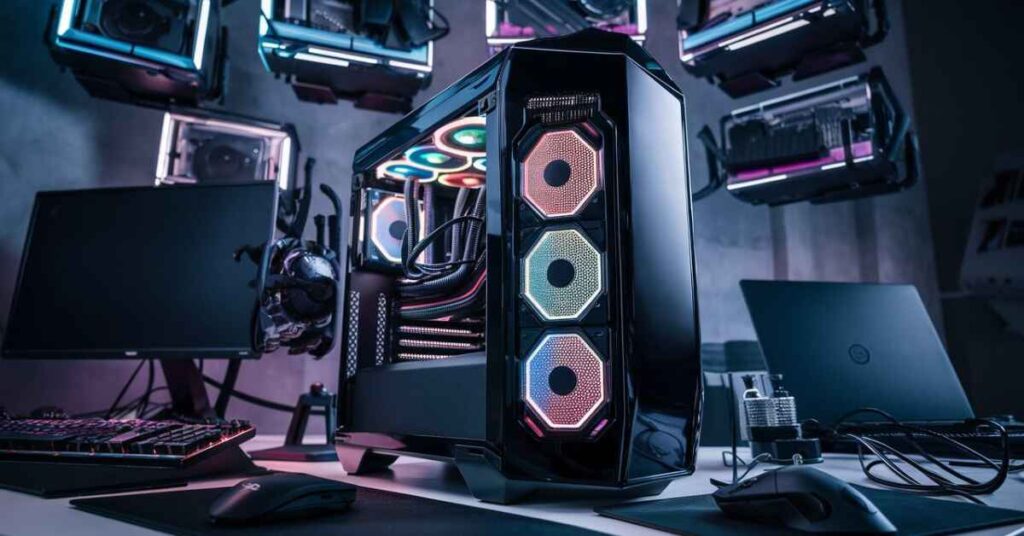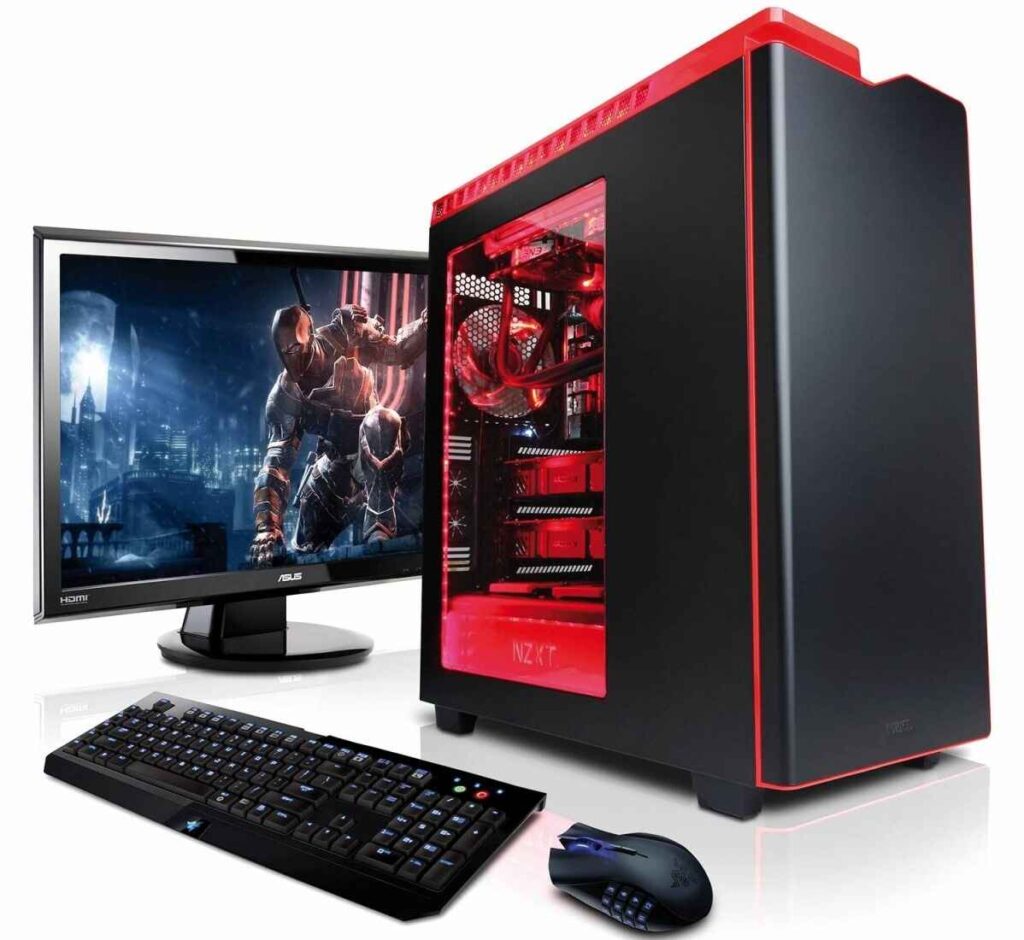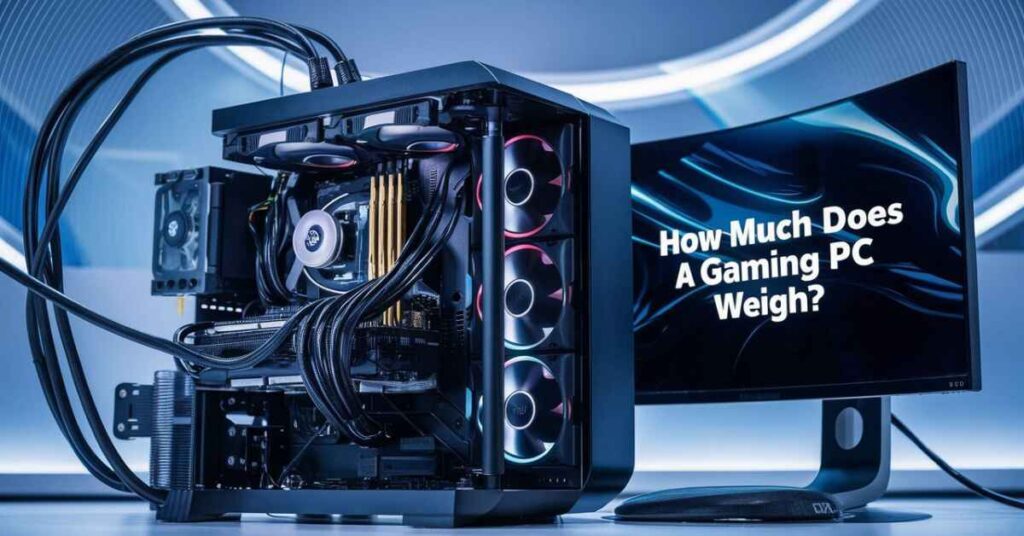
Gaming PCs come in all shapes and sizes, but one factor often overlooked is their weight. Whether you’re planning to build your rig or purchase a pre-built system, it’s essential to consider the overall weight, especially if you need to move or transport your setup frequently. in this complete guide, we’ll dive deep into the diverse additives that contribute to a gaming laptop’s weight and provide you with more information on what to expect. How Much Does a Gaming PC Weigh?
PC Tower
The tower or case mainly contributes to a gaming laptop’s weight. these enclosures can range drastically in length, from compact mini-towers to massive full-tower cases. Generally, the larger the case, the heavier it will be due to the increased use of materials like metal, plastic, and sometimes even tempered glass.
Typical weight ranges for common tower sizes are as follows:
- Mini-Tower: 5-10 lbs (2.3-4.5 kg)
- Mid-Tower: 10-20 lbs (4.5-9 kg)
- Full-Tower: 20-40 lbs (9-18 kg)
Desktop Computer Weight in Kilograms
To provide a more precise understanding of a gaming PC’s weight, let’s look at some typical ranges in kilograms:
- Mini-Tower: 2.3-4.5 kg
- Mid-Tower: 4.5-9 kg
- Full-Tower: 9-18 kg
What Does a Computer Wiegh? In Grams?
While kilograms are commonly used for larger weights, it’s often more practical to measure computer components in grams, as they tend to be relatively lightweight. Here are some typical weight ranges in grams:
- Mini-Tower: 2,300-4,500 g
- Mid-Tower: 4,500-9,000 g
- Full-Tower: 9,000-18,000 g
What is the Weight of the Monitor?
while considering the general weight of a gaming setup, it’s crucial to element within the display’s weight as well. Monitor weights can vary significantly based on their size and build quality. Here are some typical weight ranges for different monitor sizes:
- 24-inch: 5-10 lbs (2.3-4.5 kg)
- 27-inch: 8-15 lbs (3.6-6.8 kg)
- 32-inch: 12-20 lbs (5.4-9 kg)
Do PCs Without GPU Weigh Considerably Less?
Absolutely! The graphics processing unit (GPU) is often one of the heaviest components in a gaming PC. Systems without a dedicated GPU, relying solely on integrated graphics, can weigh significantly less than their GPU-equipped counterparts.
the weight difference can range from some pounds (1-2 kg) for mid-range GPUs to over 5 lbs (2.3 kg) for excessive-give-up models with beefy cooling solutions. How Much Does a Gaming PC Weigh?


Motherboard
The motherboard is the backbone of any PC, and its size and form factor can contribute to the overall weight. large motherboards, just like the ATX-shaped component, tend to be heavier because of their extended floor place and the greater components they can accommodate.
Typical weight ranges for different motherboard form factors are:
- Mini-ITX: 0.5-1 lb (0.2-0.5 kg)
- Micro-ATX: 1-2 lbs (0.5-0.9 kg)
- ATX: 2-4 lbs (0.9-1.8 kg)
Processor
While the processor (CPU) is a crucial component for performance, it’s relatively lightweight compared to other parts. Most modern CPUs weigh between 0.5-1 oz (14-28 g), with high-end models weighing slightly more due to larger heatsinks and cooling solutions. How Much Does a Gaming PC Weigh?
GPU
As mentioned earlier, the graphics processing unit (GPU) is often one of the heaviest components in a gaming PC, especially for high-end models with beefy cooling solutions. Here are some typical weight ranges for different GPU tiers:
- Entry-level: 1-2 lbs (0.5-0.9 kg)
- Mid-range: 2-4 lbs (0.9-1.8 kg)
- High-end: 4-6 lbs (1.8-2.7 kg)
It’s important to note that these weights can vary based on the specific GPU model, cooling solution, and any additional components like backplates or support brackets.
Power Supply Unit
The strength supply unit (PSU) is any other issue that may contribute significantly to a gaming PC’s weight, specifically for high-wattage models. Generally, the higher the wattage and the larger the form factor, the heavier the PSU will be.
Typical weight ranges for common PSU form factors are:
- SFX: 1-2 lbs (0.5-0.9 kg)
- ATX: 2-4 lbs (0.9-1.8 kg)
- EPS: 4-6 lbs (1.8-2.7 kg)
PC Coolers
Cooling solutions can also add to the overall weight of a gaming PC. While air coolers for CPUs are relatively lightweight, liquid cooling systems with radiators and tubing can contribute significantly more weight.
Here’s a rough comparison:
- Air Cooler: 1-2 lbs (0.5-0.9 kg)
- Liquid Cooler (240mm): 3-5 lbs (1.4-2.3 kg)
- Liquid Cooler (360mm): 5-8 lbs (2.3-3.6 kg)
RAM
Random Access Memory (RAM) modules are generally lightweight components, with most DDR4 modules weighing between 0.1-0.3 oz (3-8 g) each. Even high-capacity kits with multiple modules don’t contribute significantly to the overall weight of a gaming PC.
Hard Drive
Traditional hard disk drives (HDDs) tend to be heavier than solid-state drives (SSDs) due to their mechanical nature and the presence of spinning platters. Here are some typical weight ranges:
- 3.5-inch HDD: 0.5-1 lb (0.2-0.5 kg)
- 2.5-inch HDD: 0.3-0.5 lb (0.1-0.2 kg)
- 2.5-inch SSD: 0.1-0.2 lb (0.05-0.1 kg)
SSD
As stated above, solid-state drives (SSDs) are typically lighter than traditional hard disk drives (HDDs) because of their loss of shifting factors. The weight of an SSD can vary primarily based on its form issue and capacity, but maximum customer-grade SSDs weigh between 0.1-0.2 lb (0.05-0.1 kg).
In summary, the weight of a gaming PC can vary significantly depending on the components you choose. While some parts like the case, GPU, and power supply can contribute substantial weight, others like RAM and SSDs are relatively lightweight. It’s important to keep in mind the overall weight, mainly in case you plan to transport or transport your setup often. By information the weight contributions of everything, you can make knowledgeable selections and build a gaming rig that meets your performance and portability wishes.
FAQs
Ans: The average weight of a gaming PC can vary quite a bit, but typically falls in the range of 15-35 pounds (7-16 kg). The exact weight will depend on the size of the PC case, the number and type of internal components, and whether any peripherals or accessories are included.
Ans: The main factors that affect the weight of a gaming PC include:
Case size – Larger tower cases tend to weigh more than smaller form factors like mini-ITX.
Several components – More powerful hardware like high-end GPUs, multiple storage drives, and liquid cooling add weight.
Material of the case – Metal cases are generally heavier than plastic cases.
Peripherals included – Monitors, keyboards, mice, and speakers can add several additional pounds to the overall weight.
Ans: Yes, some gaming PC configurations are designed to be more lightweight and portable. These may use smaller form factor cases, lighter-weight components, and minimal peripherals. The lightest gaming PCs can weigh as little as 10-15 pounds (4.5-7 kg).
Ans: Gaming PCs are generally heavier than standard desktop computers. This is because gaming PCs require more powerful and robust internal components like high-end graphics cards, multiple storage drives, and sometimes liquid cooling systems.
Ans: Yes, there are a few ways to reduce the weight of a gaming PC:
Choose a smaller form factor case like mini-ITX or micro-ATX
Use lighter-weight components like an SSD instead of traditional hard drives
Opt for a single, high-end GPU rather than multiple GPUs
Use a small, lightweight power supply






